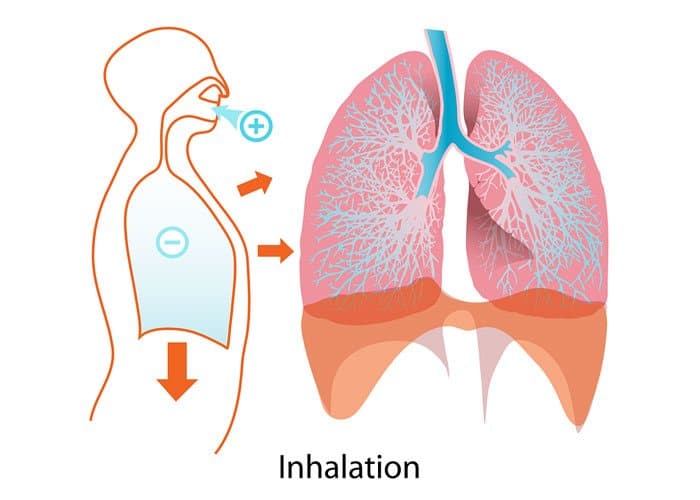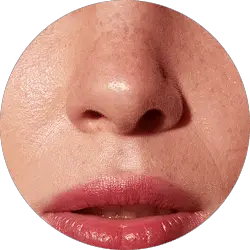Maybe you have been in a situation where a family member or roommate is snoring so loudly that, even if they’re in the next room, it keeps you from sleeping. You find yourself with your pillow wrapped around your ears to keep from going insane from the sound. Earplugs don’t work. Even when you sleep on the sofa in the next room, you can still hear the snoring!
Or maybe you’re the one who snores and your family is constantly complaining that they can’t sleep because you are sleeping so deeply—and loudly! Maybe they joke about it so much that you’re embarrassed and are wondering what can be done. The good news is that you don’t have to continue on like this! But first things first. Let’s try to understand snoring…
What is Snoring?
Snoring is simply the vibration of the parts of the respiratory system (breathing tubes, airways, etc.) that create noise when air movement is partially obstructed. Any sort of blockage or loose tissue that gets in the way can cause a noise during the process of breathing. The noise may be soft and quiet, but it is often loud and can be annoying to listen to—especially if your partner is snoring while you’re trying to sleep!
Why Do We Snore?
Snoring occurs when air does not flow freely through the breathing passages in the nose and throat while you are sleeping. Because there is a slight obstruction, the tissues tend to vibrate and produce a noise that is known as snoring. People who snore tend to have tissues in their throats or noses that are less taught and more likely to vibrate when breathing. This could be genetic or may also be related to extra weight that the person is carrying.

Why is Snoring Bad?
Some people think that snoring is just a natural part of life, but really it isn’t. A snoring problem can mean that something in your body isn’t working properly and needs to be taken care of. Chronic cases of snoring can be a sign of other very serious sleeping disorders, such as obstructive sleep apnea (OSA).
The good news is that snoring treatment is readily available in many forms that can help minimize the sounds you make when you sleep and help your entire household to sleep better as well! Depending on the reason for your snoring, you may find natural remedies or your doctor should be able to help you with your snoring problem.
SIGNS AND SYMPTOMS OF A SNORING PROBLEM
Of course one of the main signs of snoring is that someone else is there in the room (or maybe in the next room if it’s very loud!) to observe it. Maybe it’s your spouse, a roommate, or even a neighbor complaining that they can’t sleep because of how bad your snoring is. One of the difficult things about snoring is that you can’t know on your own if you snore or not—you just have to take someone else’s word for it.

Short of setting up an audio or video recorder to determine if you snore, there are some other symptoms of snoring that might point you in the right direction. Really bad snoring can mean that you aren’t getting enough sleep at night as the snoring is interrupting your breathing. Snoring may also be a sign of other sleeping problems or disorders. Other symptoms may include:
- Morning headaches
- Restless or light sleep
- Excessive sleepiness during the day
- Waking up with a sore throat
- Gasping or choking in the night
- Chest pain in the night
- Difficulty concentrating during the day
- Disrupting partner’s sleep
- High blood pressure
If you live alone and no one has told you that you snore, but you are experiencing several of these other symptoms of sleep deprivation, you should consider talking to a medical professional or contacting a sleep study clinic for observation or diagnosis options.
Snoring in Men
Statistically speaking, it is almost twice as likely for a man to show problems with snoring over a woman. In fact, around half of adult men snore on a fairly regular basis. As airways narrow in their sleep and their breathing passages are somewhat blocked, men tend to snore. And when men grow older and gain weight, there is an even greater likelihood that they will snore because the excess weight in their necks and throats make it more difficult for the air to get through. The air coming through vibrates the loose tissues in the neck, creating snoring in men.

Some men may have structural issues in their jaws or skulls which causes snoring, even in men who are not particularly large or overweight. A smaller jaw or shallow space between the nose and the back of the head can cause suction pressure as the mouth breathes, exacerbating vibration sounds—thus a snoring problem. The location of a man’s voice box lower in the throat may also be one of the reasons that men seem to snore more than women do.
Snoring in Women
Even though statistics show that more men than women snore, there are certainly still a large number of cases of snoring in women. Some of this may be due to the physical structure differences of men’s and women’s bodies. In addition to carrying excess weight, other causes of snoring in women can be related to smoking, drinking alcohol that causes respiratory muscles to relax, and aging that can reduce the muscle tone in the throat. Once women hit menopause, they seem to be more likely to snore—closing the gap in the percentages of women vs. men who snore.

Snoring in Children
Although it might seem cute when your baby or toddler breathes with a little snort or snore during sleep, there could be a problem with kids snoring. Sometimes when your child is snoring, it is an indication of a short term illness such as a cold or stuffy nose simply due to winter weather. Allergies and respiratory infection may also be indicated if your child has an issue with chronic snoring. Snoring babies can simply be related to the fact that little ones sometimes have stuffy noses and it may not be a need for concern.

Enlarged tonsils and adenoids in children is a common cause of snoring in children, which can lead to obstructive sleep apnea (OSA) and possibly even the need for surgery. A deviated septum is another structural abnormality that can be related to snoring, particularly in babies.
If you notice your baby, child or teenager snoring, be sure to contact your pediatrician for a full examination. Snoring could be an indication of a more serious sleeping disorder or health condition and your child should be under the care of a medical professional.
Snoring in the Elderly
As people get older, their muscles tend to lose tone and elasticity, and it is more likely that they will snore. In addition, people tend to put on weight as they age, creating more opportunity for loose skin in the throat and nasal passages to obstruct breathing and make snoring noises. Sleep apnea is also a common reason for snoring in old people.

Loud Snoring
Some people snore gently and quietly, and it sounds more like heavy breathing. But other people have really loud snoring that can be so disruptive that it wakes them up! Loud snoring is not only annoying, but it can be a sign of a dangerous sleeping disorder: obstructive sleep apnea (OSA). About half of the people who snore very loudly do so because of this condition. When your breathing passages become so restricted that snoring is very loud, it could be an indication that your body is not getting enough oxygen. If you or a family members snores very loudly, be sure to check with your doctor about this.
Chronic Snoring
A person who snores sporadically may do so for a variety of reasons including a stuffy nose, cold, seasonal allergies, or any other type of situation that temporarily blocks the breathing passages. But when people snore all this time, this is chronic snoring. When considering chronic snoring vs. normal snoring, you may need to see a doctor if your snoring happens all the time. Chronic snoring may be the result of smoking, drinking alcohol, long-term nasal congestion, thyroid problems.

Severe Snoring
Severe snoring is similar to chronic snoring in that it is ongoing, but it may be even louder or having other problems along with it. Severe signs of snoring include loud snoring, snoring that happens every day, observed pauses in breathing during snoring, waking up in the night or not being able to sleep well because of snoring, or other problems. This severe snoring may be related to another sleeping disorder such as sleep apnea, and should be cared for under the attention of a medical professional.
CAUSES OF SNORING
So we know what snoring is, but what causes snoring? Why do people snore? In many cases, there are underlying conditions that present themselves that may be what causes people to snore. We know that narrowed or blocked breathing passages can be a culprit, but what is the underlying cause of those breathing passages being narrowed or blocked? What are types of breathing passages that can be narrowed? What causes snoring in different types of people?
We’ll answer those questions here!
Types of Snoring Causes
Snoring may be caused by a variety of different airway blockages including nasal, mouth, tongue, palate, or other disorders such as sleep apnea:
Nasal Snoring. When breathing passages are blocked in your nose, this can cause nasal snoring. Some people struggle with this due to the fact that their nostrils are simply small and they were born with this. Some people might have seasonal or long term allergies or hay fever which results in sinus blockage and an inability to breathe through the nose during sleep.
Other people may have had an accident or injury which contributed to the septum being deviated. The septum is the bone-like cartilage between the nasal passages that separates them. If this is structure is out of alignment by birth or through damage, then nasal snoring can occur.

Mouth Snoring. Some people, even though they may not have physical restrictions to their noses, are just naturally mouth breathers. For people who normally breathe through their mouths, mouth snoring can be a problem. When air enters through the mouth instead of the nose, it comes into contact with the back of the throat and can be the cause of vibrations in the soft tissue there.

Tongue Snoring. Certain people who have tongues that are enlarged or malformed may encounter problems with tongue snoring. Sometimes called “tongue base snoring”, the tongue drops into the back of the throat and over the breathing passages, creating vibrations and snoring sounds. Some people are simply born with larger tongues. Other people may develop it over time due to obesity and weight gain. Some people who have problems with their thyroid function may develop an enlarged tongue which causes snoring and can lead to sleep apnea.

Palatal Snoring. The soft palate is located at the back part of the roof of the mouth and can be the cause of snoring as the tongue, uvula and soft palate vibrate together. If the roof of the mouth is particularly fleshy due to weight gain or simple genetics, palatal snoring could be a serious problem.

Sleep Apnea. One of the most serious reasons for snoring, sleep apnea is the blockage of airways that results in reduced breathing. The limited oxygen supply from sleep apnea snoring can cause dangerous, long-term conditions including heart problems, diabetes, obesity, high blood pressure, and other health issues.
What Causes Snoring in Men
Some people want to know why do men snore more than women?! What causes snoring in males likely has less to do with gender and more to do with the size of men’s necks and throats as well as the low position of the Adam’s apple in their necks. In addition, weight gain, obesity, aging, sleep apnea, alcohol use, smoking, and more. The good news is that most of the causes for snoring in men are able to be cured with natural lifestyle changes, or sometimes surgery.

What Causes Snoring in Women
So we know that men account for about two thirds of snorers, but that leaves one-third of snorers left who are women. But why do women snore? When looking at what causes snoring in females, we see many of the same conditions related to men snoring. In addition, women are more likely to struggle with health problems related to their thyroid gland, and that can have a significant impact on snoring as an enlarged thyroid can create an airway blockage or an enlarged tongue. Menopause may also contribute to women snoring as muscle tone in the throat begins to lack following this change in women’s lives.

What Causes Snoring in Children
Kids can be so sweet and precious when they are sleeping—except when they start to snore loudly! So why do kids snore anyway? One of the leading causes of snoring in toddlers and children is due to enlarged adenoids or tonsils. When these childhood glands swell, they can press up against the breathing passages and narrow the airways, which causes snoring. This may also be a problem for sleep apnea and should be checked out by a medical professional.
Sometimes parents also ask the question “why do babies snore?” which is often related to some sort of nasal blockage. Deviated septum or nasal congestion may be the cause of a snoring baby, but it could also be a sign of central sleep apnea in which the brain does not trigger the body to breathe as it should while sleeping. Babies who have sleep apnea will typically have pauses in breathing that last more than 20 seconds long. If your baby’s snoring gives you cause for concern, mention it to your doctor just to be on the safe side.

What Causes Snoring in the Elderly
From babies to the elderly, snoring can affect just about anyone of just about any age! People who are getting older have few different reasons why they tend to snore more than younger people. Many of the reasons behind snoring could be an indication of more serious health complications. Older people may suffer from nasal congestion or stuffy noses that cause them to breathe through their mouths while sleeping, which can induce snoring.
Consumption of alcohol and smoking can both lead to snoring, as well as taking certain prescription drugs or narcotics. As people grow older, they often gain weight and obesity can be a strong contributing factor to whether or not a person snores. Decreasing muscle tone, especially related to hormone loss in women who have passed through menopause, can loosen the tissues in the throat and cause obstructions that create snoring. As people age they should be more aware of snoring and the possible health problems that exist along with it.

Loud Snoring Causes
As the tissues in the throat, mouth and tongue are fully relaxed, gravity can cause this tissue to fall back and partially (or even fully!) block the airways and cause snoring or other sleep disorders. The louder the snoring, the more likely it is that a person has seriously blocked airways and may even have sleep apnea. Sleep apnea is often what causes loud snoring in adults, or sometimes in children who have swollen tonsils or adenoids. The more overweight a person is, the more likely he or she is to struggle with breathing during sleep and end up snoring loudly.
Chronic Snoring Causes
The causes of chronic snoring can vary depending the anatomy and the health conditions of each person. Some people have noses, skulls, jaws, or tongues shaped in such a way that their breathing is disrupted when they fall asleep. The vibration of the air passing roughly through the breathing passages is what causes snoring. When snoring happens only sometimes, it may be due to temporary situations such as a head cold, seasonal allergies, drinking alcohol, sleep deprivation or even sleeping in a certain position.
People who have chronic snoring usually find that it is caused by something that lasts in the longer term such as weight gain, a deviated septum, enlarged tonsils or adenoids (in children), smoking, enlarged tongue (many times in people with thyroid problems), a soft palate, or having a sleep disorder such as sleep apnea.
The good news about loud and chronic snoring is that it is usually treatable, often through natural means that do not require a great deal of medical intervention. Sometimes surgery is required. And snoring that is caused by sleep apnea will need to be treated at the source as it could have a profoundly negative impact on your quality and length of life.

SNORING TREATMENT
Maybe you’re the one who is snoring—or maybe you’re desperately trying to find a snoring treatment for your spouse before you do something drastic due to your lack of sleep! In any case, many snoring treatment options exist, but the best treatment for snoring will depend on what is causing the person’s snoring to begin with.
When seeking out treatment for snoring, be sure to contact a medical professional and/or sleep clinic to determine if the cause of snoring is a serious condition such as sleep apnea. If it is, they will help you find the best possible medical options for your situation.
How to Treat Snoring
Most people want to know how to treat snoring naturally as they would rather deal with the problem on their own that involve a doctor. Especially is their snoring is benign and not related to any other health conditions or sleeping disorders.
Some natural ways to reduce snoring include:
- Humidifier. People who have dry nasal passages may struggle to breathe well at night. Running a cool mist humidifier in the room at night can help to clear stuffy noses and reduce snoring. Staying well hydrated also can help with breathing.
- Sleep Position. When people sleep on their backs, gravity can affect their ability to breathe so changing your sleep position to the side or stomach may help. Certain pillows and mattresses are made especially to help you learn to sleep in a healthier position.
- Weight Loss. Dropping even just a few extra pounds can make all the difference when it comes to breathing well during sleep. If your Body Mass Index (BMI) is higher than 25, then you need to lose some weight and should talk to a medical professional or nutritionist about the best way to do so. This will not only help you to stop snoring, but you’ll find yourself in a better overall state of general health.
- Avoid Alcohol. Because of the way that alcohol causes the muscles to relax, drinking can definitely make snoring worse. Plus alcohol has a tendency to cause sleep to be less restorative. So go ahead a skip that night cap—opt for a cup of decaffeinated herbal tea instead.
- Open Nasal Passages. Some people find that simply opening up the nasal passages works to stop snoring. Certain companies make stick-on strips that help with this when worn at night during sleep.
- Stop Smoking. For a variety of health reasons, smoking is terrible for you and snoring is just one of the reasons that you should take care of your body and aim to stop smoking.
- Avoid Sedatives. Although some people have trouble getting to sleep and try to use sedatives to help, they may actually be making your snoring worse. The muscle relaxation has a similar effect to the use of alcohol and can exacerbate problems with snoring as well as sleep apnea, insomnia, and other sleeping conditions.
- Tongue Exercises. Some people who struggle with snoring because of “floppy” tissue in their mouths may be able to increase the muscle tone by using certain tongue exercises.
- Treat Allergies. If your snoring is due to allergies, then seeing an allergist and getting treated for these can be the simplest path to stop snoring.
- Get Enough Sleep. Snoring can sometimes be caused by sleep deprivation. Getting the doctor recommend seven to eight hours of sleep each night may allow your body to reset your sleep pattern and eliminate problems with snoring.
Snoring Treatment Medication
Typically doctors prefer to offer patients natural treatments when possible, however some medication for snoring may be used depending on the cause. For people who have nasal stuffiness, a decongestant drug for snoring may be useful. Some companies produce an over-the-counter anti-snoring throat spray that helps to lubricate the breathing passages to reduce snoring. Other options for snoring pills or medication are tablets that tend to reduce the swelling in soft tissues which could help to reduce the amount of snoring, although may not stop it completely.
Snoring Treatment Devices
If you’re looking for a non-medicinal remedy for your snoring, there may be several options for you depending on what the reason is for your snoring.
- Nasal Strips. These are simply what they sounds like—adhesive strips that attach the outside of the nose to keep the nasal passages open. This can be very helpful for people who snore due to blocked nasal passages, stuffy nose, allergies, or possibly even deviated septum.
- Mandibular Advancement Devices (MAD). For someone who struggles with snoring because their jaw falls back to block the airways, this device helps to keep the jaw situated forward. This allows more space for air to get through and also could help with people whose tongues tend to fall back and get in the way of breathing passages.
- Tongue Stabilizing Devices (TSD). This is considered by some to be an alternative oral appliance device for people who snore. A small piece of plastic that sits in the mouth and sort of resembles an over-sized pacifier, the tongue is inserted inside to keep it from falling back to block the airways and obstruct breathing.
- Chin-up Strips. These strips help to secure the jaw so that you are forced to breathe through your nose instead of your mouth. This snoring device may work as external support for people who snore because they are mouth breathers. In some cases these strips are self-adhesive and disposable, but some brands offer durable straps that are elasticized and reusable.
- Vestibular Shields. This device is made of a soft plastic-like material and looks like the gum shields that are used for sports. Putting this inside the mouth, the air flow into the mouth is blocked which forces you to breathe through your nose. These devices can be molded by hot water to form comfortably to your mouth.
Snoring Treatment Surgery
For some people, the only real way to cure their problem is to have surgery to eliminate snoring. This will depend on what the specific problem is that is causing you to snore.

Some types of surgery for snoring include:
- Nasal Septoplasty. This surgery for a deviated septum is done to repair the wall that separates the two nostrils. This wall can become misaligned at birth or due to an injury of some kind. When the septum is not aligned, breathing through the nose can be difficult and
- Somnoplasty. This surgery uses heat or radio signals to modify the tissues of the mouth including the soft palate and the uvula. Local anesthesia is required for this outpatient surgery. This surgery may be used for snoring but is not indicated for use with sleep apnea, and it will only be effective if your soft palate and/or uvula are the cause of your snoring. This surgery is also sometimes referred to as radiofrequency tissue ablation.
- Pillar Procedure. One option for snoring surgery is the implantation of tiny pieces of braided polyester filaments into the soft palate. This stiffens the soft palate so that it doesn’t vibrate as much and may be able to reduce the amount of snoring or eliminate it altogether.
- Tonsillectomy or Adenoidectomy. In children, this is one of the most common surgical procedures related to snoring and sleep apnea. Enlarged tonsils and adenoids in children can block the airways so the removal of these childhood glands may help to stop snoring related to sleep apnea in children.
- Uvulectomy. In more extreme cases, it may be recommended that the entire uvula is removed in order to eliminate or reduce snoring. This would be a form of laser surgery and may require more than one treatment in order to get the results you are looking for.
Treatment for Loud Snoring
Really, the best treatment for loud snoring depends on what exactly is the cause of your snoring in the first place. If your snoring comes along with gasping for air during the night and a number of other symptoms, then you may have sleep apnea. In this case your loud snoring treatment and sleep apnea treatment are likely to be the same thing. If your loud snoring is suspected to be caused by sleep apnea, you’ll participate in a sleep study and may then be treated with a Continuous Positive Airway Pressure (CPAP) machine to keep you breathing well all through the night.
Chronic Snoring Treatment
When considering treatment for chronic snoring, just like with any other type of health condition, the priority is to determine what is causing the problem in the first place. Your doctor may refer to a sleep clinic to help rule out serious issues such as sleep apnea or other sleeping disorders. If you do have sleep apnea then a CPAP (Continuous Positive Airway Pressure) breathing machine may be prescribed for you to help you get your life back from snoring. The best treatment for chronic snoring will address the specific needs that you have, whether they be related to nasal blockage, an enlarged tongue, swollen adenoids or many other issues.
WRAPPING IT UP
Snoring is a common part of life that should not be taken lightly. Most people think that snoring is just normal, but really it should be taken more seriously than it often is. If you or someone close to you have a problem with severe or chronic snoring, a trip to the doctor is encouraged in order to get the care that is needed. The good news is that snoring is often preventable and/or curable! You don’t have to live with your partner keeping you awake with snoring any longer!
